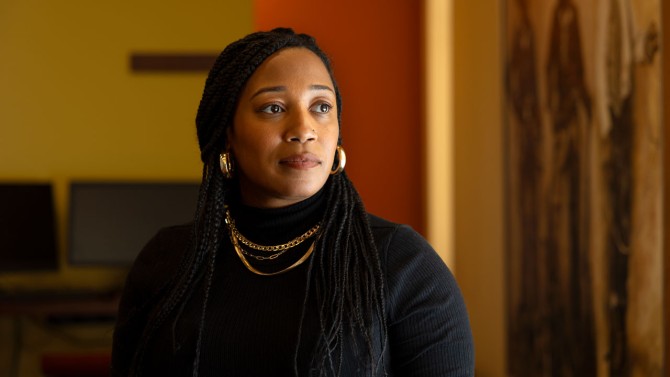Breaking silence: Speak up to honor MLK Jr., historian says
By Susan Kelley, Cornell Chronicle
Our collective memory of Martin Luther King Jr. focuses on his advocacy of nonviolent direct action. But according to a Cornell historian, that memory ignores his most radical message: the importance of speaking up against social injustice.
“Chief among the things that we misremember is how much he called attention to the fact that so many white moderates were silent in the face of injustice. He was a huge critic of that,” says Michell Chresfield, assistant professor of Africana studies in the College of Arts and Sciences.
Martin Luther King Jr. Day, a federal holiday, falls on Jan. 15 and marks King’s birth on Jan. 15, 1929.
“One of the most radical things about him is that, to great sacrifice, and despite the number of times that there were threats and attempts on his life, he kept speaking up,” Chresfield says. “Despite the number of times that he was arrested, that even revered and respected religious leaders did not have his back, he continued to speak up. That, to me, is one of the most important aspects of his legacy.”
Chresfield’s research and teaching focuses on Black and Indigenous histories, the history of science and medicine, and the history of racial formation and identity-making in 20th century America. She teaches courses including “Black Body Politics: Histories, Theories and Debates.”
King’s vision was quite radical in other ways, as well. After the passage of the Civil Rights Act of 1964 and the Voting Rights Act of 1965, he turned much of his attention to unfair employment practices, she says. “He’s a critic of capitalism. And that’s one of those things that we really forget about him, is how much he cared about making sure that people had a fair wage.”
He was marching to support Memphis sanitation workers’ demands for better wages and working conditions when he was assassinated, on April 4, 1968.
He connected economic justice to the Vietnam War in a pathbreaking speech exactly one year before his assassination, at Riverside Church in New York City in 1967. The speech, “Beyond Vietnam: A Time to Break Silence,” was his first major public statement against the Vietnam War and signaled his separation from then-President Lyndon B. Johnson’s support of the war. It was an unpopular stance, although opposition to the war was growing. “He’s in a church, he’s talking to other religious figures, and he’s talking about the importance of speaking up, of not being silent, regardless of the cost,” Chresfield says.
King wanted discussions about social and economic justice to have a productive tension rather than just acquiescence, Chresfield says. “He was not a fan of just brushing over things. He wanted the confrontation of ideas at least,” she says. “Just because he was committed to nonviolent direct action did not mean that he was going to shy away from the hard-hitting conversations, and really getting to the root of things.”
That approach still resonates today, she says, in the global, national and local arenas. The Black Lives Matter movement, for example, is a direct outgrowth of the Civil Rights Movement, she says, with its focus on direct action, establishing goals and programs, and assembling coalitions of people working toward a common goal.
On MLK Jr. Day, she encourages people to celebrate King and his legacy by being “deeply engaged and critical of our current environment, because Black people and other marginalized people continue to face injustice,” Chresfield says. She herself has been called the N-word by a classmate and has been judged on the color of her skin. “So while it is important for us to celebrate King’s legacy and contributions, our society still has so much further to go,” she says.
The holiday is about how we remember MLK’s radicalness, so we may fully appreciate our current moment, Chresfield says.
“It is really important that we remember, but remember fully, because these erasures are so harmful to our current experience,” she says. “If we can’t fully connect with where we came from, then we can’t really mobilize to go in the direction that we want to, and move forward with clarity and dignity and purpose.”
Media Contact
Abby Kozlowski
Get Cornell news delivered right to your inbox.
Subscribe

